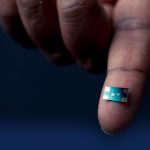
Inside the 21,000-square-foot UCF NanoScience Technology Center (NSTC), faculty members, students and research staff members are exploring nanotechnology’s vast possibilities. Nanomaterials are being used as drug delivery systems. As the building blocks of highly precise lasers. As the key to more efficient solar energy, rocket propulsion and environmental waste cleanup. The scope is so wide that you can’t help but wonder how the NSTC narrows down its field of research applicants to choose the next projects.
“We always try to see what is the next big thing needed to fuel the economy,” explained Seal. Then almost immediately, he expanded the possibilities. “We choose things to contribute to the next frontiers of science.”
According to Seal, those frontiers lie in the areas of medicine, energy, water purification, environmental cleanup and green technology. His own research focuses on the development of nanofuels and industrial materials that produce less environmental waste.
“New technologies are always trying to mimic what nature has been doing all along,” he says. “So, can we create solar panels that convert energy as efficiently as those tiny leaves create energy for a massive tree? Can we engineer cancer therapies that work as efficiently as our own cells that differentiate uncontrollably and cause cancer in the first place? That’s what our research is asking.”
Even when researchers find the answer in the labs, the road to market can take more than a decade. To date, NSTC researchers have launched six spin-off companies to advance their research from the
lab setting to marketable consumer products and patient therapies.
The process takes both time and money. While NSTC projects have received grants from several local and federal partners, including the National Institutes of Health, NASA and the Army Research Laboratory, nanotechnology funding overall is on the decline in the U.S.
O’Neal remains optimistic about the future potential of the field.
“It took 40 years for science to tap into the full potential of laser technology,” he says. “That’s how it will be with nano. The discoveries are just starting to become more prolific. People will get excited about nano again, and the funding will follow, but it won’t be because of one big thing. A bunch of small successes can add up to a pretty big change.”
For the science of small, perhaps there will be no revolution. Just an evolution of our world happening all around us, in baby steps.
From Research to the Real World
Some of the key discoveries made in UCF NanoScience Technology Center labs have the potential to lead to these remarkable real-world applications:
- An over-the-counter cancer test, similar to a home pregnancy test
- DVDs with triple the storage capacity
- Lithium batteries with dramatically higher energy capacity
- Robotic fingers and hands sensitive enough to perform surgery
- Super-capacitors that store much larger amounts of solar and wind power
- Faster, more accurate testing of pharmaceutical cancer therapies
- Preventive treatments for Alzheimer’s disease
- Treatments that use a patient’s own stem cells to fight Alzheimer’s, Parkinson’s, diabetes, cancer and heart disease
- A concrete-substitute that can be produced with zero carbon emissions (concrete production currently accounts for 5 percent of worldwide carbon emissions)
Read On:
- Read the complete article from Pegasus: The Magazine of the University of Central Florida
- Browse the entire issue online